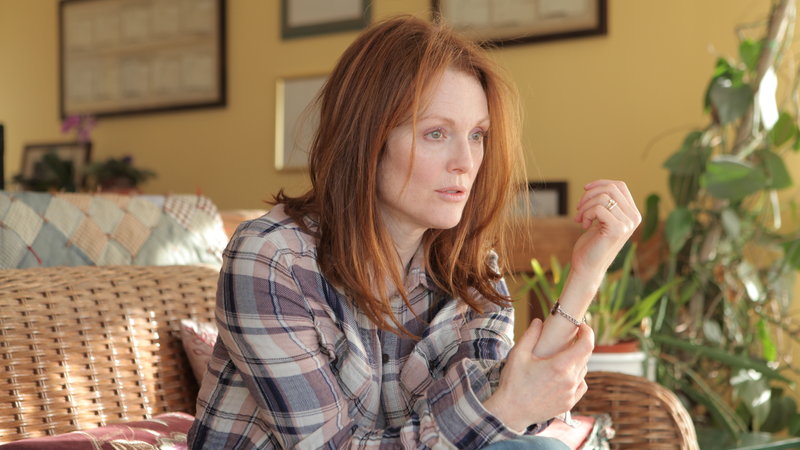A circumstance that might well qualify as a fate worse than death is to continue living after one side of the human equation — body + mind — has been canceled. For a jaunty account of an active brain in a withering physique, see The Theory of Everything; for a more anguished view of the opposite situation, there’s Still Alice.
The story opens, with chilling chronological precision, at the 50th-birthday party of Alice Howling (Julianne Moore). The milieu is upscale intellectual Manhattan, nearly as perfect as the family living in it. Husband John (Alec Baldwin) is a medical researcher at Columbia University, where Alice also teaches. Daughter Anna (Kate Bosworth) is married and laboring to produce the couple’s first grandchild; son Tom (Hunter Parrish) is nearly a doctor. Only the youngest, Lydia (Kristen Stewart), has wandered off the accepted path, skipping college — and mom’s birthday — to attempt an acting career in LA.
We will come to have some sympathy for Lydia, if only because she’s a rumple, however small, in a overly tidy scenario. Alice can’t simply be a 50-year-old who experiences disturbing lapses of memory. When she begins to forget words, it’s while lecturing in her specialty: linguistics.
Many of such details come from Lisa Genova’s best-selling novel, which directors Richard Glatzer and Wash Westmoreland have adapted with reasonable fidelity. The two men, longtime artistic and life partners, have a personal interest in the subject of bodies and brains that age at different speeds: Glatzer has ALS and now speaks via a computer’s voice synthesizer.
As its choice of pronoun indicates, Sarah Polley’s Away from Her considered early-onset Alzheimer’s from the perspective of a man who watches his wife’s consciousness disappear. Still Alice takes a riskier strategy, attempting to show its protagonist’s experience from the inside. Glatzer and Westmoreland picked the right actress for the job.

9(MDAxOTAwOTE4MDEyMTkxMDAzNjczZDljZA004))

